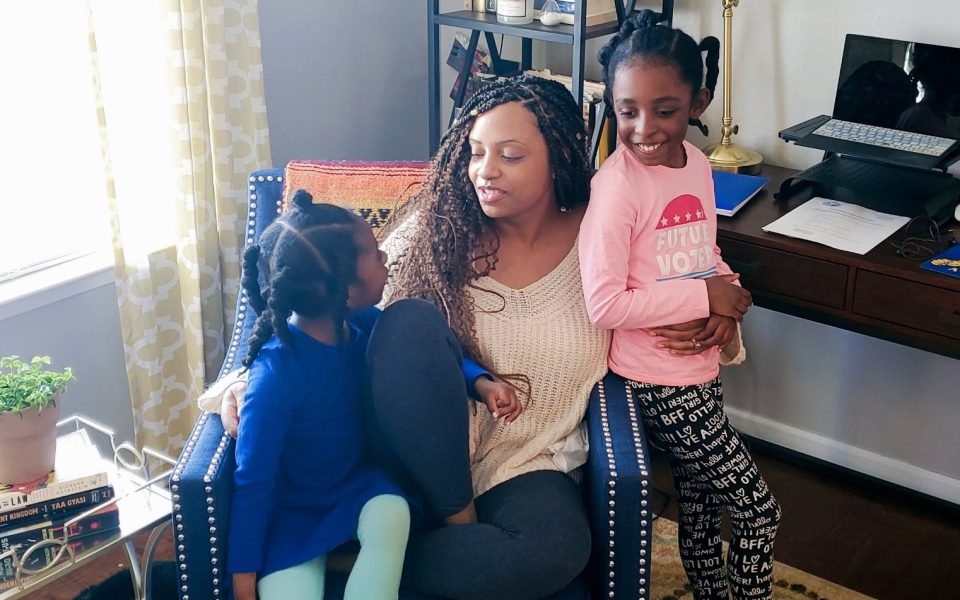by Adrienne Spinner / Featured photo: Spinner with her daughters
In the past year, my family has fallen into a daily routine of organized chaos.
My husband wakes our daughters a little after 7 a.m. After breakfast, getting dressed, brushing teeth and cleaning their room, my oldest, Vivienne, settles at the dining room table by 7:45 to wait for her teacher to call her for class. My husband’s “office” is directly across from her, and he spends at least 30 percent of his workday troubleshooting the technology, keeping her on schedule and uploading her work for grading.
I begin my workday at 9 a.m., but it is light at first, so I can entertain our youngest, Stella, until around 9:30. I plan her lessons from workbooks purchased online each morning, and three days a week, we have a trusted friend spend a few hours with her so I can work. Stella is done with “school” in around an hour, but needs supervision for other activities like puzzles, games, art, lunch prep and playing outside.

We cannot afford a caretaker full-time, so days without help are spent in a delicate balance, causing me to delay a lot of work until after bedtime. I consider myself very blessed to have a flexible job and coworkers that don’t mind the crazy distractions that come across my background during Zoom calls. But by the end of the day, our house is a wreck, dinner is usually take-out, and I have a habit of passing out in front of Disney+.
Because both my husband and I work full-time, we do not qualify for the public pre-K provided by the state. Our household income is too high to meet the requirement, but affording private pre-K is still going to be a significant financial burden. So, when Stella turned four we decided to register her for the same half-day preschool that Vivienne was in. Eventually we felt that they were not taking enough COVID precautions, so we ended up disenrolling her.
Both of my girls have excelled this past year, given unprecedented circumstances, but it has been tough on all of us. Even though both my husband and I have struggled with productivity at times, I can’t imagine how difficult our lives would be if one of us was a single parent, or if our jobs didn’t allow us to work remotely.
Passage of the American Families Act would lift the burden that a lot of families like mine are currently feeling. We stand in the gap of qualifying for public pre-K and affording private school. While Stella has done great academically, she has missed out on an entire school year of social and behavioral growth with kids her age, learning important skills in preparation for kindergarten. Prioritizing early-childhood education would mean that every 4-year-old has the opportunity to participate in quality public preschool. During COVID, families wouldn’t have to worry about affording private school, or a school that wasn’t required to take adequate safety precautions.
Stella will start kindergarten this August, and our concerns regarding her readiness are ever-present. In a recent study of programs in Boston, researchers tracked the progress of children who won a spot in pre-K via lottery, compared to students who did not. While there was no significant difference in the standardized test scores of pre-K students versus those who didn’t attend, researchers realized that there are more concrete measures that should be prioritized in a student’s overall well-being.
Students that attended pre-K excelled in social and emotional growth, showing faster maturity than students who did not attend.
This foundation often leads to more positive outcomes throughout school, like higher SAT scores, higher graduation rates and increased likelihood of attending college.
Given the achievement disparities that already exist in education, — especially in communities of color and low-income communities — the anxiety that I have for my children to have a strong foundation is common. With private school options being out of reach for so many, having universal and affordable early-childhood education will ensure that all children have the opportunity to start school on an even playing field.
Even as my children get older, I am still a fierce advocate for affordable childcare for young kids, better pay for early-childhood educators, universal pre-kindergarten across the country, and paid-leave for working parents and caretakers. My family is lucky, but we have had plenty of challenges. Having the American Families Act become law will give folks peace-of-mind, knowing that their children are taken care of in a way that they can afford.
Adrienne Spinner is a mom of two and community organizer. She serves as the Director of State Organizing for NC Housing Coalition and volunteers with NC Council for Women, Guilford for All and Black Womxn Lead. Follow her on her blog at MelantatedMovementMama.com.
Join the First Amendment Society, a membership that goes directly to funding TCB‘s newsroom.
We believe that reporting can save the world.
The TCB First Amendment Society recognizes the vital role of a free, unfettered press with a bundling of local experiences designed to build community, and unique engagements with our newsroom that will help you understand, and shape, local journalism’s critical role in uplifting the people in our cities.
All revenue goes directly into the newsroom as reporters’ salaries and freelance commissions.


Leave a Reply